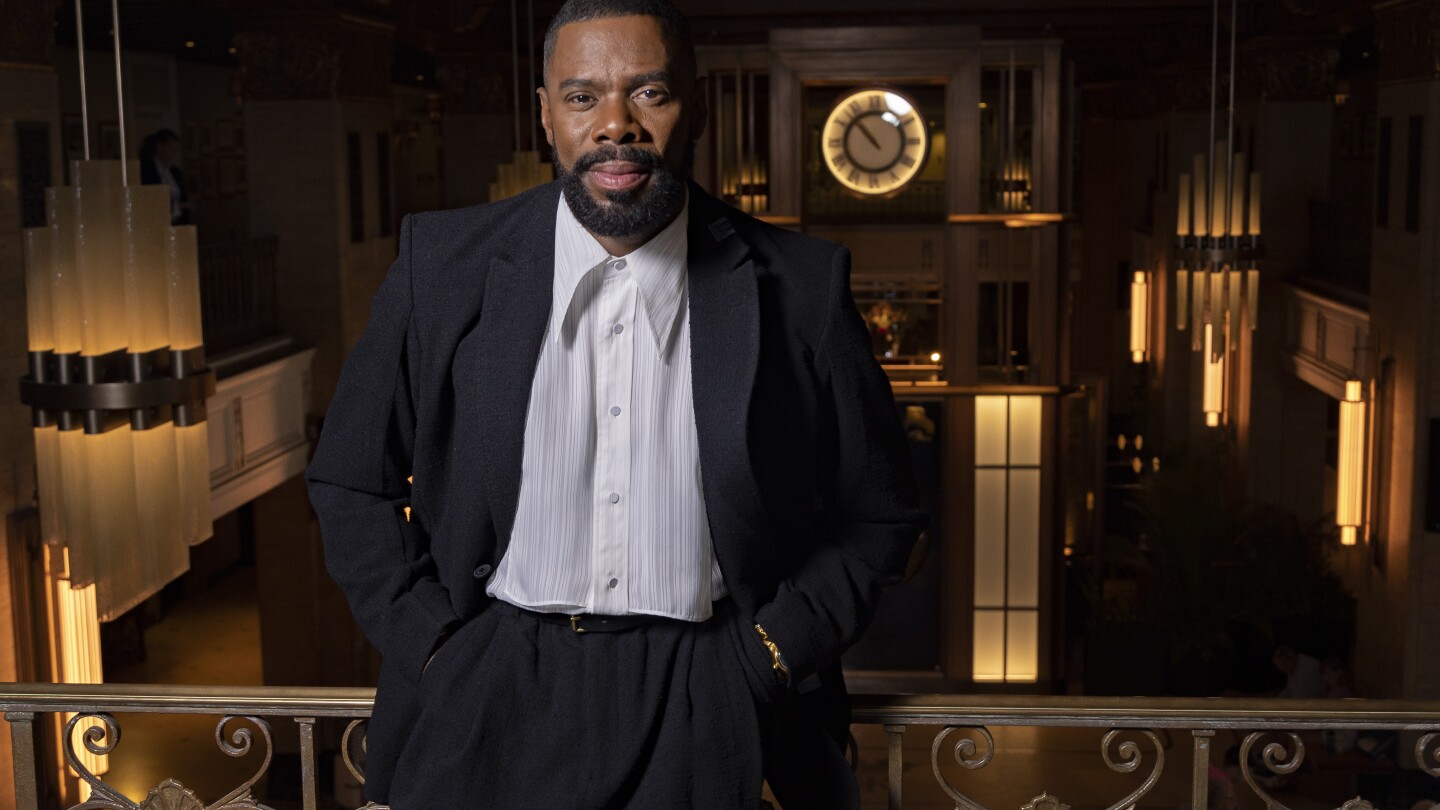World
Colman Domingo’s time is now

NEW YORK (AP) — Colman Domingo has a commanding physical presence, an expressive face and soulful eyes. But his most limber and powerful tool is his voice.
It can go low in a bone-rattling baritone, like in his Nigerian-accented pimp in Janicza Bravo’s “Zola.” Or it can rise to the warm, erudite rhythm of civil rights leader Bayard Rustin, in “Rustin.” In Steven Spielberg’s “Lincoln,” Domingo’s voice, as a union soldier, is the first thing you hear.
Domingo, himself, isn’t sure when his voice became so resonate. Tracing it sends him back to his childhood, growing up a self-described outsider — gay, awkward, unsure of himself — in west Philadelphia. That voice, he says, wasn’t there 20 years ago.
“At some point, as I grew into this person, comfortable in my own skin, sexuality, my mind, my intentions, who I am in the world, I think my voice developed more,” Domingo says. “I don’t know that I had this voice before. All the resonance in my voice, I can hear it. There’s confidence. There’s gravitas to it. I hear exactly what people hear now.”
Domingo as Bayard Rustin in a scene from “Rustin.” (Parrish Lewis/Netflix via AP)
People are finally hearing Domingo. His performance in George C. Wolfe’s “Rustin” — Domingo’s first time atop the call sheet — has made the 53-year-old journeyman actor a favorite for a best actor Oscar nomination. It’s a deft and dazzling leading performance that channels all the complexities of the March on Washington architect.
Domingo also co-stars as Mister, the abusive antagonist of “The Color Purple,” one of the most anticipated holiday releases. The roles couldn’t be more different. Throw in the fall-festival hit “Sing Sing,” in which Domingo stars alongside a cast of mostly formerly incarcerated actors (A24 will release it in 2024), and you have the full spectrum of what Domingo is capable of.
Years of struggle as a supporting player in service of others have finally led to his turn in the spotlight.
“I started to feel like: Well, what happened, God? What is my journey? At some point, my journey felt like Bayard’s journey, which is maybe why I feel we’re so close,” Domingo says. “You know, I’ve assisted many people getting Oscars. I’ve assisted many people getting a lot of shine and love.”
On the heels of the actors strike ending, Domingo met recently at a Manhattan hotel overlooking Central Park. After months of being unable to promote that part of his life, he had been thrown straight into late-night appearances, interviews and a “Rustin” screening in Washington, with Barack and Michelle Obama, whose Higher Ground Productions produced the film. Domingo threw a bunch of cold-weather clothes together and jumped on a plane from Los Angeles.
“Basically, I was shot out of a cannon,” he says, smiling.
Domingo, sincere and amiable in conversation, had the appearance of someone eminently aware that a hard-earned moment had finally arrived.
“I keep telling people that I’m 54 years old. Because for this to happen now, it’s unusual,” Domingo says. (His birthday is Nov. 28.) “Suddenly, after 32 years, it seems like the sun is shining on every corner of my career.”
Domingo in a scene from “The Color Purple.” (Ser Baffo/Warner Bros. Pictures via AP)
Domingo was raised in a working-class family by his mother and step-father. Domingo’s father, whom he’s named after, wasn’t a part of his life. It wasn’t until he took an acting class at Temple University that he began acting. In regional theater, starting in San Francisco, he honed the wide-ranging ability of a character actor.
“Growing up, I never thought I was much to look at it. I think it liberated me,” Domingo says. “I know I can play a handsome man and a hideous man because I’m liberated. I can play anything. I’m not looking at myself. I’m not taking myself too seriously. I have the body of a clown.”
To “The Color Purple” director Blitz Bazawule, Domingo is belatedly becoming the leading man he was destined to be after years of out-acting more famous co-stars.
“Colman comes from the old-school of actors. You think about Bogart or you think of Daniel-Day,” says Bazawule. “These people, the minute you hear them or see them, there’s a clear presence. I think he is in that tradition of leading men. Colman takes the frame.”
Voice played a central role in Domingo finding Rustin. The film, which is streaming on Netflix, depicts the tireless grassroots activism of Rustin, who was openly gay, in organizing the 1963 march where Dr. Martin Luther King Jr. would give his “I Have a Dream” speech. Domingo was flummoxed by the origin of Rustin’s Mid-Atlantic accent before talking with Rachelle Horowitz, who organized transportation for the march.
“She said, ‘He made that up,’” Domingo says. “I thought that was key. Here was someone who truly created themselves at a time when everyone was trying to write you off or box you in or violate your body because you’re Black and queer. I thought: That’s courage.”
(AP Photo/Chris Pizzello)
Domingo’s own path also required self-invention. His first breakthrough came in the play “Passing Strange,” which ran at the Public Theater in 2007 before opening on Broadway in 2008. Though celebrated — Colman shared in an Obie award for ensemble — once the play closed, Domingo found himself bartending again.
Resolving to make his own opportunity, Domingo wrote and staged the autobiographical “A Boy and His Soul,” a dexterous one-man play that used the soul music of his youth (Earth Wind & Fire, Donna Summer) to evoke his life story and the inspirational figure of his mother, his greatest champion. In it, he recalls his mother telling him: “Keep a song in your heart, and you will always find your way.” She and Domingo’s stepfather died in 2016.
“I started writing my solo show in the last year of my mother’s life and I didn’t know that that writing was going to save my life,” Domingo says. “I was writing so I could be with my family 90 minutes a day.”
Domingo’s production company, Edith, is named after his mother. When her son was struggling to catch a break, she wrote at least six letters to Oprah Winfrey, Domingo says. “She said, ‘She could help you. I want you to know her.’ I was like, ‘Mom, Oprah doesn’t care about me.’”
“The prayers and wishes people have for you are sometimes more profound than what you imagine, yourself,” says Domingo.
(AP Photo/Chris Pizzello)
In the years that followed, Domingo’s range only extended. He did comedy on the series “The Big Gay Sketch Show.” He was Tony-nominated for “The Scottsboro Boys” on Broadway. “Fear the Walking Dead,” in which he played Victor Strand over eight years, brought him to his widest audience yet. Directors like Barry Jenkins (“If Beale Street Could Talk”) and Bravo (“Zola”) came calling.
“When I was cast in ‘Zola,’ I thought, ‘Me, playing a pimp? What? In this dark comedy? What do you see in me?’” says Domingo. “And Janicza Bravo said, ‘I see that the possibilities of the way you think are endless.’
Wolfe, the esteemed theater director, first cast Domingo in “Ma Rainey’s Black Bottom,” alongside Viola Davis and Chadwick Boseman, as the trombone-player Cutler. Gradually, he came to see Domingo as Bayard Rustin.
“I would be talking with Mark Rickler the production designer, ‘Oh, Colman could do that.’ Part of my brain would go, ‘Oh, Colman could do that,’’ recalls Wolfe. “It was an organic conversation that had a degree of inevitability but I didn’t realize it at the time. I think all good smart decisions, there’s a sense of inevitability.”
Now, Domingo finds himself collaborating with some of the Hollywood legends his mother envisioned him with. Winfrey is a producer on “The Color Purple” and the two have become friendly. During a hike for Ava DuVernay’s birthday in Hawaii (DuVernay cast Domingo in “Selma”), he told Winfrey about the letters his mother wrote her.
“I said, ‘I think I just realized that you answered her letters,’” Domingo says. “And she clutches her heart and says, ‘Oh, Colman.’ And then we started hiking again.”
___
Follow AP Film Writer Jake Coyle at: http://twitter.com/jakecoyleAP

World
EU ministers water down proposal on child sexual abuse

A proposal on combatting child sexual abuse has been watered down by some EU justice ministers, with others expressing their regret at certain elements of the proposal being removed entirely.
With the development of new technologies, sexual abuse of children has seen a rise in Europe.
The EU is therefore looking to update its directive on combatting the sexual abuse and sexual exploitation of children, which dates back to 2011.
However, the EU Commission’s initial proposal has been watered down by the justice ministers of several EU countries. Seven Member States, which include Belgium, Finland and Ireland, expressed their regret at the removal of certain parts of the proposal.
“We deeply regret that the majority of Member States were unable to support a more ambitious approach aimed at ensuring that children who have reached the age of sexual consent receive the strongest and most comprehensive legal protection possible against unwanted sexual acts,” they wrote in a press release.
Key issues remained unaddressed
Isaline Wittorski, EU regional coordinator at child rights organisation ECPAT International, is particularly concerned regarding Member States’ opposition to the extension of the limitation period for pursuing child sexual abuse cases.
She also regrets that “grooming” – the process by which an adult intentionally approaches minors and manipulates them for sexual purposes – for children who have reached the age of sexual consent was not addressed by the Council.
“The Member States expressly refused to recognise in the text that a child in a state of shock or intoxication cannot be considered to have consented to sexual abuse”, she adds.
Harmonisation of penalties
The Commission’s proposal aims to harmonise the definition of sexual violence against minors and penalties within the EU.
It will also update criminal law in order to criminalise the rape of children broadcast live on the internet, as well as the possession and exchange of paedophile manuals and child abuse deepfakes.
MEPs, for their part, should support a more ambitious directive. Birgit Sippel, a German MEP (S&D), is calling for longer limitation periods.
“Many children who have been abused take years or even decades before they dare to go to court or to a police station. So this is a very important step that is missing from the current directive,” the MEP told Euronews.
“Unfortunately, what I see is that the Council is watering down almost everything that could improve the current directive. It will therefore be very important for the EU Parliament to maintain a very strong position and force the Council to go further and not limit itself to the current directive,” she added.
The proposal’s text can still be amended. After a vote by MEPs, negotiations will take place between the EU Commission, the European Council and the European Parliament.
It is estimated that one in five children in Europe is a victim of some form of sexual violence.
In 2022 alone, there were 1.5 million reports of child sexual abuse in the EU.
Ministers also failed to reach agreement on another regulatory text aimed at combatting the sexual abuse of children online, which aims to force platforms to detect and remove content depicting sexual violence against minors. This proposal caused a clash between children’s rights defenders and privacy protection lobbies.
World
Girls5eva Cancelled at Netflix

ad
World
Christmas trees in Germany were decorated with apples instead of ornaments in the 1600s for 'Adam and Eve Day'

The choosing and decorating of a Christmas tree to display during the holiday season is a beloved tradition with a long history.
Today, Christmas trees are often decorated with an array of ornaments, including glass ones, homemade creations, candy canes, tinsel and sparkling lights, but that was not always the case. There was a time in history when Christmas trees were adorned with edible items, including apples, to commemorate the feast of Adam and Eve on Dec. 24.
Germany is credited with starting the tradition of the Christmas tree, according to History.com, with 16th century records telling of Christians bringing trees into their homes for the holiday.
Christmas trees were not always decorated with a large array of ornaments. During the early days of the Christmas tree, they were instead covered in red apples. (iStock)
PRESIDENT FRANKLIN D. ROOSEVELT SOLD CHRISTMAS TREES TO LOCAL RESIDENTS ON HIS OWN ESTATE IN THE 1930S
The Christmas tree has evolved over time, especially in the way in which it is decorated.
In the 1600s, it was typical for a Christmas tree to be decorated using apples, according to the National Christmas Tree Association.
The feast of Adam and Eve, held on Dec. 24, was honored by a “Paradise Play,” which told the story of Adam and Eve.
The play featured a “Paradise Tree,” according to the website, The Catholic Company, which was decorated with apples.

Apples were placed on the “Paradise Tree” used in the play telling the story of Adam and Eve. (iStock)
HOW TO SAY ‘MERRY CHRISTMAS’ IN 10 LANGUAGES TO FRIENDS AROUND THE WORLD
It was popular in Germany to set up “Paradise Trees” in homes, according to several sources, including Britannica and CatholicProfiles.org.
Then, in the 1700s, evergreen tips were hung from the ceilings of homes, also decorated with apples as well as gilded nuts and red paper strips, according to the National Christmas Tree Association.
It was not until the 1800s that the Christmas tree made its way to the United States by German settlers, according to the source.

Today, families cover their Christmas trees in a variety of festive ornaments. (iStock)
At this time, Christmas trees were not the large displays they are now, and they simply sat atop a table, per the National Christmas Tree Association.
Then, in the mid-1800s, trees began to sell commercially in the U.S. By the late 1800s, glass ornaments became a common decoration for the Christmas tree, according to the National Christmas Tree Association.
Today, every family has their own traditions and preferences when it comes to decorating the Christmas tree.
Some go with a very complimentary design, sticking to a single or couple of colors. Others opt for a mix-matched arrangement, combining homemade ornaments with more classic ones, as well as colorful lights, ribbon and more.
-

 Business1 week ago
Business1 week agoOpenAI's controversial Sora is finally launching today. Will it truly disrupt Hollywood?
-

 Politics5 days ago
Politics5 days agoCanadian premier threatens to cut off energy imports to US if Trump imposes tariff on country
-
/cdn.vox-cdn.com/uploads/chorus_asset/file/25782636/247422_ChatGPT_anniversary_CVirginia.jpg)
/cdn.vox-cdn.com/uploads/chorus_asset/file/25782636/247422_ChatGPT_anniversary_CVirginia.jpg) Technology6 days ago
Technology6 days agoInside the launch — and future — of ChatGPT
-
/cdn.vox-cdn.com/uploads/chorus_asset/file/25789444/1258459915.jpg)
/cdn.vox-cdn.com/uploads/chorus_asset/file/25789444/1258459915.jpg) Technology4 days ago
Technology4 days agoOpenAI cofounder Ilya Sutskever says the way AI is built is about to change
-

 Politics4 days ago
Politics4 days agoU.S. Supreme Court will decide if oil industry may sue to block California's zero-emissions goal
-
/cdn.vox-cdn.com/uploads/chorus_asset/file/25546252/STK169_Mark_Zuckerburg_CVIRGINIA_D.jpg)
/cdn.vox-cdn.com/uploads/chorus_asset/file/25546252/STK169_Mark_Zuckerburg_CVIRGINIA_D.jpg) Technology5 days ago
Technology5 days agoMeta asks the US government to block OpenAI’s switch to a for-profit
-

 Politics6 days ago
Politics6 days agoConservative group debuts major ad buy in key senators' states as 'soft appeal' for Hegseth, Gabbard, Patel
-

 Business3 days ago
Business3 days agoFreddie Freeman's World Series walk-off grand slam baseball sells at auction for $1.56 million

















